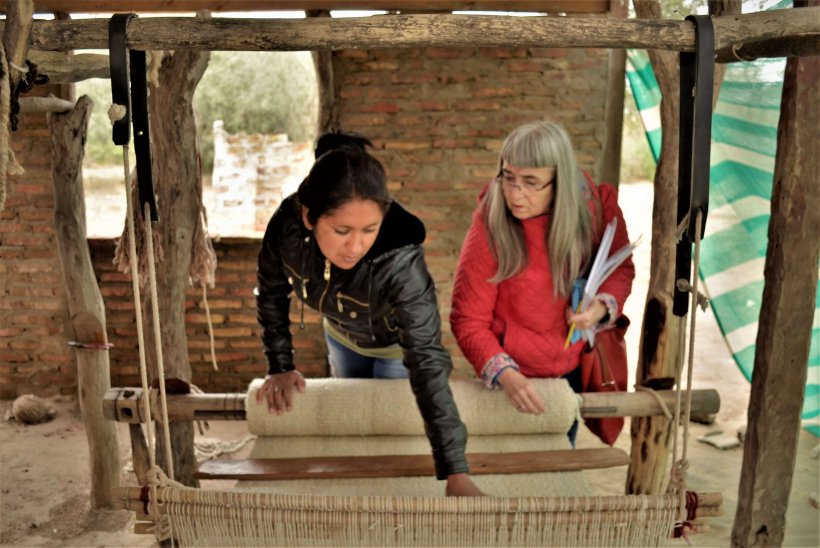By Natalia Zlachevsky – Mora Laiño
Translation: Julieta Wilhelm and Florencia Cresta
In an office on the 36th floor in Wall Street, Manhattan’s business center, an eight-meter carpet lays on the floor, handcrafted by Nelly, a woman from Santa Rosa, a remote area in the province of Santiago del Estero, Argentina.
In that area, a group of weaver and spinner women are part of the “Huarmi Sachamanta” (women from the mount) Association and their crafts are the main income of their families. Handcrafted carpets travel from the mount of Santiago del Estero to New York ‒ more than 7,000 kilometers.
As part of Engineering Without Borders’ work in the field, a survey of the textile manufacture process in which these women take part was carried out. Their products are completely handcrafted. Every carpet is a unique, handmade piece of work. From the sheep’s wool, which is selected and spun to form a hank, to the search of natural stains that come from the mount plantations, the water supply to do the washing, and the making of looms, which are kept in their homes and homemade, the modern ones, with wooden boards or trunks from local trees.
In Santiago del Estero, working in looms is associated with women’s or mother-and-daughter activities, although many men actually take part in different tasks, like the washing or the carpet handicraft. In many cases, the spinning and weaving become the main productive activity in the family.
At 15 years old, Nelly studied in a traditional arts and crafts school in a near rural area called Blanca Pozo. The training lasted years, it´s by no means an easy task to weave. Once the spinners, with the help of a spinning wheel, turn yarns into skeins, the knitters dye the wool and knit the carpets. For a number of years now, Nelly and other women are part of the Association, which at a time reached 50 women members from the area, among knitters and spinners. The “Huarmi Sachamanta” upholds a logic of community work, not only in sharing working materials and a wool bank; but also, in administrative issues.
The commercialization process of the end-product includes intermediaries, generally from Buenos Aires, who buy the carpets from Santiago del Estero women and are later sold in New York or other cities of the world, setting a new selling price.
Ethical trade is an alternative, supportive, transparent and collaborative commercialization system, based in equal treatment and fair financial retribution, taking into account the environment and being respectful of handcrafted work. Some of the conditions that should be included in this commercialization system are:
-
Label that includes the craft-person name to make their work known.
-
Price negotiation based on transparency.
-
Creation of opportunities and Access to financing for economically disadvantaged producers
-
Decent working conditions; elimination of child or forced labour.
-
Gender equality and freedom of association.
-
Respect for the environment.


